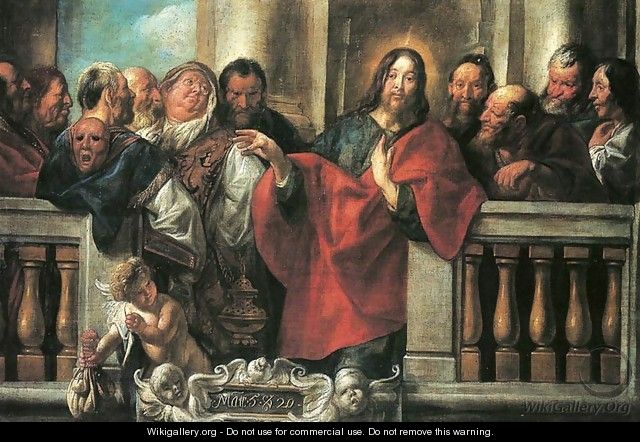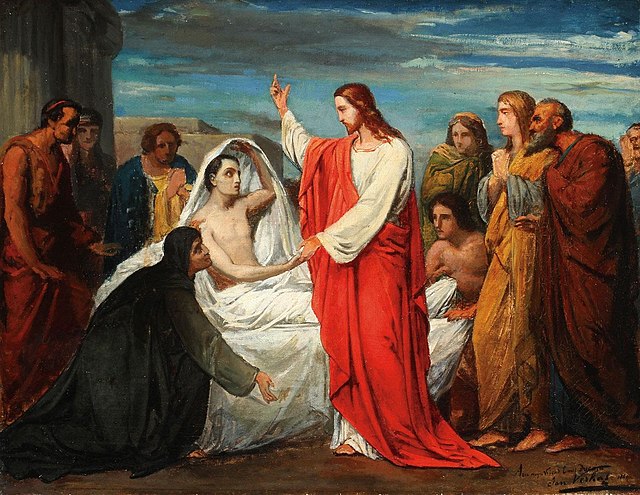Luke 14:1-11
Pastor James Preus
Trinity Lutheran Church
September 26, 2021
There’s the letter of the law and then there’s the spirit of the law. The letter of the law uses words to command outward obedience. The spirit of the law is the meaning behind the words, the true intent of the commandment. If a mother tells her teenager to go to bed, and the teen sits in her bed until two o’clock in the morning talking to friends on the phone, she may have kept the letter of the law by going to bed, but she has broken the spirit of the law by staying up late. And so too, these Pharisees and lawyers are very good at keeping the letter of the law, but they prove that they have no intention of keeping the spirit of the law.
The letter of the law for the Third Commandment states, “Remember the Sabbath day, to keep it holy. Six days you shall labor, and do all your work, but the seventh day is a Sabbath to the LORD your God. On it you shall not do any work, you, or your son, or your daughter, your male servant, or your female servant, or your livestock, or the sojourner who is within your gates. For in six days the LORD made heaven and earth, the sea, and all that is in them, and rested on the seventh day. Therefore, the LORD blessed the Sabbath day and made it holy.” (Exodus 20:8-11). The Pharisees and lawyers kept this commandment to the letter. The letter of the law is easy. But they failed to keep the spirit of the law.
What is the spirit of the Third Commandment? It is the spirit of every commandment: love. (Romans 13:9) The first table of the Law commands you to “love the Lord your God with all your heart, soul, and mind.” And the second table of the Law commands you to “love your neighbor as yourself.” (Matthew 22:37-39) And the Apostle Paul states, “Love does no wrong to a neighbor; therefore, love is the fulfilling of the law.” (Romans 13:10) This is why Martin Luther in the Small Catechism begins his explanation to every commandment, “We should fear and love God, so that…” If you do not love, then you have not kept the commandment, even if you have followed the command to the letter.
And Jesus, who himself is the author of the entire law, demonstrates this perfectly by showing mercy on the man suffering from dropsy. Dropsy is an illness where a person retains fluids, so that his body swells. Jesus asked the Pharisees and lawyers whether it was lawful to heal on the Sabbath. What Jesus was asking was whether it is lawful to love on the Sabbath. His opponents were silent, because they did not know the spirit of the law. Jesus broke the letter of the law by healing the poor man, so that he could keep the spirit of the law.
Sometimes the letter of the law needs to be broken in order for the spirit of the law to be kept. Jesus demonstrated this when he would heal people on the Sabbath day. The priest Ahimelech demonstrated this, when he took the show bread, which is only lawful for the priests to eat, and gave it to David and his men, because they were hungry and in distress (1 Samuel 21). Love and necessity may bring a Christian to break the letter of the law in order to keep the spirit. However, people will try to abuse this. Neither love nor necessity permits you to commit adultery or fornication, despite the abuse of the word love. It is not loving to serve a false god to avoid offending a non-Christian friend. Rather, love means to put God first and your neighbor’s needs before your own.
The purpose of the Third Commandment was two-fold. First, for the body. God commanded that the people of Israel observe the day of rest for themselves and for their servants and animals. It is neither healthy nor virtuous to work all day every day. Everyone should take a moment of rest for the sake of their body, mind, and soul. The second purpose of the commandment is for the soul. The Sabbath was a day to rest from your labors, so that you could hear and learn God’s holy Word. As Luther wrote in his hymn on the Commandment, “And put aside the work you do, So that God may work in you.” This commandment taught the people of Israel to love the LORD their God.
Because Jesus has fulfilled the Law by coming in the flesh, suffering and dying for our sins, and rising from the dead, we are no longer obligated to keep the letter of the Third Commandment by refraining from work on a particular day. St. Paul writes in Colossians chapter 2, “Therefore let no one pass judgment on you in question of food and drink, or with regard to festival or new moon or Sabbath. These are a shadow of the things to come, but the substance belongs to Christ.” This is why we are not forbidden from eating pork or shell fish, neither are we obligated to celebrate the Passover or the Feast of Booths. And we are not forbidden from working on Saturday. These were all a shadow. Christ is the substance.
Yet, the spirit of the law remains. We are still required to love God. Jesus says, “If you love me, you will keep my commandments.” (John 14:15) Jesus commands us to listen to his word and to believe in him. This is why Martin Luther explains the meaning of the Third Commandment like this, “We should fear and love God so that we do not despise preaching and His Word, but hold it sacred and gladly hear and learn it.”
Why do Christians go to church? Because they love Jesus. Jesus promises us that wherever two or three are gathered in his name, there is he in the midst of them. (Matthew 18:20). After commanding that his disciples baptize and teach, he promises, “And lo, I am with you always, even to the end of the age.” (Matthew 28:20) Jesus promises to be where his Word is taught and preached. He promises to be in the Sacraments, even feeding us his very body and blood every Sunday. Christians go to church, because they love Jesus. They want to be with him. The want to learn from him. They want to pray to him and praise him. They want to love those who love him. They want to be comforted by him.
Christians love Jesus, because they have faith in him. Jesus again invites us, “Come to me, all who labor and are heavy laden, and I will give you rest.” (Matthew 11:28) Of course, the word Sabbath means rest. Jesus is our Sabbath rest. We love Jesus, because he gives us rest from our burden of sin. Jesus labored like no man has ever labored before. And he did it for us. He took our sin from us, so that all who come to him in faith are released of their burdens. We go to church out of faith and love toward Jesus Christ, who has redeemed us from sin, death, and the power of the devil. Through faith the spirit of the law is fulfilled in us, because through faith we love our Lord.
Christians go to church on Sunday, because Jesus rose from the dead on Sunday and from that week on, Christians have been gathering on the first day of the week to hear the teaching of Jesus, to pray, and to receive the Sacrament. In the year 303 AD, the Roman Emperor Diocletian declared an edict forbidding Christians from gathering to worship and commanded that they hand over their Sacred Writings. In February of 304 AD, 49 Christians in Abitinae, North Africa were caught gathering for worship on Sunday despite the prohibition. Although they were tortured, none of them denied their Lord. When the man who hosted the church service, Emeritus, was asked why he lent his home for this illegal activity, he answered, “Sine Dominico non possumus.”, which means, “Without Sunday (literally: the things of the Lord), we cannot live.” They loved the Lord Jesus. They could not live without going to church on Sunday to receive from him the rest Jesus’ promises in his word and Sacraments. These saints of Abitinae kept the Spirit of the Sabbath and each earned a martyr’s death.
After Jesus healed the man with dropsy, he told a parable about being humble. He concluded, “For everyone who exalts himself will be humbled, and he who humbles himself will be exalted.” Jesus is not simply giving instructions on banquet etiquette. By teaching us to be humble, he is teaching us about faith and love.
The Proverb says, “Pride goes before destruction, and a haughty spirit before a fall.” (Proverbs 16:18) Would you trust an art critic, who was blind? Would you be flattered if a deaf person told you that you had a beautiful singing voice? Of course not! Then why do you listen to your pride, which is blind to your faults and deaf to all constructive rebuke and criticism? Pride prevents you from having a repentant heart. It lies to you and justifies all your sins, so that you don’t feel bad. And pride does not trust in Christ. Why would someone sit in the place of honor, when he has not deserved it? Because he does not trust that he will be given a place of honor if he sits in a lower seat. People justify themselves, because they do not believe that God will justify them if they come to him in humility with their sins.
But the humble have faith. The humble confess their sins, that they are poor miserable sinners. The humble trust that God will raise them up based on his own mercy. This is what the man with dropsy did. He no doubt heard that Jesus had compassion on the afflicted, so he found Jesus and came to the banquet, despite the disgust others would have over him, because he trusted that Jesus would heal him. To be humble means to have faith that Christ will exalt you.
Pride is antithetical to love. A person who is proud loves himself. A person who is humble loves others instead of himself. We humble ourselves before God out of love for him. When we go to church to hear his word and to praise him, we are humbling ourselves to say that God is more important than anything else we have going on in our life. We humble ourselves before Jesus and acknowledge him as our Lord, because we love him instead of ourselves. And this love draws us to humble ourselves before our neighbors as well. St. Paul tells us in humility to count others more significant than ourselves (Philippians 2:3). Humility is the outward exercise of love, which is the spirit of all the commandments.
Jesus does not only demonstrate perfect love for us to imitate. Jesus perfectly loved us to save us from the disease of our sin. Through faith, we humbly receive Jesus’ love and are counted perfect by our heavenly Father. Faith in Christ’s love exalts us to the heavenly places, where we have been called to live with God for eternity. And this faith in Christ’s love also produces love in us, so that we seek to fulfill the commandments, not out of selfish ambition, but out of love for God who loves us and out of love for our neighbors, who are loved by God.
May Christ dwell in each of your hearts through faith, so that you may be forever grounded and rooted in love. Amen.




 RSS Feed
RSS Feed